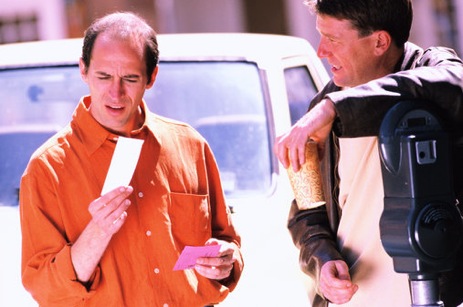Consumerist empowers consumers to take on bad companies, but sometimes even the negative PR that Consumerist can bring to bear is not enough to persuade companies to behave. When that happens, you might have to sue in order to get what you want. Here is a brief guide to your options when you decide you need to escalate your complaint to the courts.
law

Powerful People Want To Hear Your Arbitration Horror Stories
If you’ve been screwed by arbitration, our consumer and public interest friends in DC would like to hear your story for something special they’re cooking up. Arbitration agreements are clauses inside many contracts between companies and yourself that, in the event of a dispute, prohibit you from suing the company in a court of law. Instead, you have to take your case to a special arbitration firm. Arbitration bills itself as a speedy and fair way to resolve legal disputes, but it’s come under heavy fire recently for being heavily weighted in favor of companies. If you’ve gotten the short end of the stick, send your story to arbitration.stories@gmail.com.

Chicago Sheriff Halts Foreclosure Evictions, Won't Toss Innocent Renters
Cook County Sheriff Tom Dart said he understood he was flouting the law in refusing to have deputies carry out the rising number of eviction requests, but mortgage holders must be accountable.

Leaked ACTA Treaty Will Outlaw P2P
ACTA—the misleadingly named “Anti-Counterfeiting Trade Agreement”—is the worldwide copyright treaty that’s being negotiated behind closed doors, and that will create a sort of global DMCA if continues in its current state. Now Wikileaks has posted a draft of the treaty, and Boing Boing’s Cory Doctorow gives his take:

L.A. County Tells Taco Trucks To Keep Moving
Peter writes to let us know that taco trucks in Los Angeles county now have to move to a new position every hour: “The county of Los Angeles has enacted some new legislation to prevent taco truck owners from staying in one spot, with penalties of a fine of up to $1000 or jail for failures to comply.” Why such a weird law? Because area restaurants say they’re stealing away customers. If you like your carne asada from the side of a truck, be prepared to start chasing them down as they circle through L.A. county in a weird Mexican-food carousel.

New York State To Start Taxing Amazon Purchases
One of the budget-related changes voted in last week by New York State’s politicians included a new “Amazon tax”:
“Another $50 million will come from requiring online retailers like Amazon that do not have a physical presence in New York to collect sales taxes on purchases made by New Yorkers and remit them to the state.
New York’s argument, based on a reading of the 1992 Quill vs. North Dakota U.S. Supreme Court ruling, is that because Amazon makes sales through affiliates who live in the state, it can be considered to have a physical presence there—which means the new law wouldn’t apply to retailers who don’t use affiliate programs.

The Vast Majority Of Philadelphia Parking Tickets May Be Invalid
A CBS investigation has revealed that parking tickets stemming from 85% of the parking meters in Philadelphia are invalid. Pennsylvania law requires inspectors to certify each parking meter for accuracy once every three years, but the single inspector working for Philly’s Licenses and Inspections Department, the city agency in change of certification, has visited less than 15% of all parking meters—but he has found the time to certify some meters 8 times while others go completely unchecked. As a result, thousands of parking tickets are invalid under state law.

Charges Filed Against Importers Of Toxic Toothpaste
On Tuesday, the city of Los Angeles and the FDA charged the heads of two U.S. importing companies with 14 counts each of “receiving, selling and delivering an adulterated drug,” for their roles in importing and distributing over 70,000 tubes of toothpaste containing diethylene glycol (DEG) instead of glycerin. “Each count carries a maximum penalty of one year in jail and a $1,000 fine.”

Plastic Surgery Company Sues Consumer Site For Negative Customer Reviews
Lifestyle Lift claims it’s a “minor one-hour procedure with major results,” but a lot of customers who have paid for the procedure have been left unhappy, and they’ve consequently posted reviews about it on a plastic surgery review blog called RealSelf. Lifestyle Lift has sued RealSelf, claiming trademark infringement, and now RealSelf has countersued, claiming Lifestyle Lift padded RealSelf’s site with shill reviews.

Exxon May Have Its Punitive Damages For Valdez Spill Cut In Half By Supreme Court
The Supreme Court is currently considering whether to halve the punitive damages levied against Exxon for its massive 1989 oil spill from the Exxon Valdez tanker, from the current $2.5 billion to something more like $1 billion. Exxon claims the higher number amounts to excessive punishment. According to the New York Times, the decision may come down to a tie with four justices on either side; Justice Alito is not participating because he owns Exxon Mobile stock. The Exxon Valdez disaster “caused a 3,000-square-mile oil slick and still affects Alaska’s fisheries after nearly 19 years.”

House Passes Bill That Would Require Colleges To Practice Network Filtering
Last week the House voted 354-58 to approve a college funding bill that requires colleges to “make plans to offer some form of legal alternative to P2P file-swapping” and to implement some form of network filtering. Luckily for sane people everywhere, the White House has already made veto-noises at the bill for other reasons—but still, the MPAA came that much closer to forcing its admittedly false worldview on universities.

Legally Blind Woman Sues Fast Food Restaurants For Rudeness
A legally blind New York woman sued several fast food restaurants for ridiculing her when she asked for help reading their menus, but a federal judge threw out the suit on the grounds that “ADA laws don’t regulate ‘rudeness or insensitivity’ of workers.” Last week, however, an appeals court overturned that ruling and now the suit—” believed to be the first of its kind—could go before a jury this year.”

Answers To NYC Renters' Questions
How do you get your landlord to require the upstairs neighbors to put down carpets? A lawyer who “has practiced in the landlord-tenant arena for more than two decades” has been answering these sorts of questions on the New York Times’ “City Room” blog. The advice he gives, while helpful and specific, is mostly based on what we imagine are NYC-specific problems and cites New York statutes, but it still might be helpful for renters elsewhere with similar problems.

January 1st, 1808: Slave Importation Banned In US
Considering we spend a good deal of time focusing on legislation that protects consumers and/or (usually or) businesses, we thought it appropriate to point out one of the big historical moments of trade law, not to mention human rights—tomorrow marks the “200th anniversary of Jan. 1, 1808, when the importation of slaves into the United States was prohibited.” Hey, it didn’t stop the madness, but at least it was a start.

Second Jersey Scammer Who Claimed To Cure Lou Gehrig's Disease Imprisoned
On December 12th, the U.S. District Court of New Jersey sentenced Elizabeth Lerner, a.k.a. Elizabeth Cooperman, to 33 months in prison for “falsely claiming that she could cure amyotrophic lateral sclerosis (ALS), commonly called ‘Lou Gehrig’s Disease.'” Her crime partner, former osteopath Charlene C. DeMarco, was sentenced to 57 months back in September.

Article Recounts Sony's Rootkit Debacle In Detail
Remember Sony’s cringe-inducing copy protection scheme a couple of years ago, where they secretly installed rootkits on millions of customers’ PCs and then pretended it was no big deal? (“Most people, I think, don’t even know what a rootkit is, so why should they care about it?” — Thomas Hesse, Sony BMG’s President of Global Digital Business.) There’s a new article (PDF) about to be published in the Berkely Technology Law Journal called “The Magnificence of the Disaster: Reconstructiong the Sony BMG Rootkit Incident.” It’s a very detailed and entertaining read that examines the conditions that led Sony BMG “toward a strategy that in retrospect appears obviously and fundamentally misguided.”




